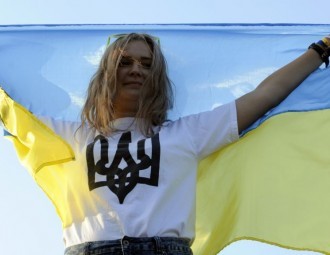Uladzimir Matskevich: New people in Rada give hope for improvement in Ukraine’s political situation

For all reservations, the results of the Ukrainian election aren’t disappointing;voters support healthy forces in Ukraine, the head of the Board of the International Consortium “EuroBelarus” believes.
According to the exit poll as of 8 p.m. on October 26, the pro-presidential Poroshenko Bloc won Ukraine’s early parliamentary elections, taking 23.6% of the vote.
The Popular Front headed by Prime Minister Arseny Yatseniuk came second with 19.9%.
The Samopomich Party (“Self Reliance Party” – EuroBelarus) came third with 12.6%.
The Radial Party of maverick politician Oleh Liashko took 8.1%, while the Opposition Bloc, largely made up of former supporters of ousted President Viktor Yanukovych, got 5.8%.
The right-wing Svoboda Party took 7.4% of the vote, and former PM Yulia Tymoshenko’s Batkivshyna Party took 5.6%.
“EuroBelarus” Information Service discussed the preliminary results of the Ukrainian parliamentary election with Uladzimir Matskevich, the head of the Board of the International Consortium “EuroBelarus”.
- Judging by the results, can we talk about de-Sovietization of the new Rada?
- If we think about the fact that it is for the first time that the Communist Party didn’t get enough votes for Verkhovna Rada, it might mean something. And if six of seven parties that according to the results of the exit polls passed in parliament support reforms in Ukraine, the country’s sovereignty and adhere to European orientation, I believe we can talk about de-Sovietization of the Ukrainian society; about Ukraine’s readiness to assert its future by people’s choice.
- Does it mean that Ukraine says goodbye to its past irreversibly?
- We can’t give unequivocal answer to that question, as we see quite low voter turnout at this election. Even in the Western Ukraine, where people voted more actively, the turnout didn’t exceed 50 per cent, which means that some people do not make choice, though they can be mobilized with the political situation and respond to negative or positive changes in Ukraine. Thus, it is too early to talk about irreversibility.
- What is significant for you at the exit poll?
- The results of the exit polls demonstrate quite low result of Batkivshyna Party, which means that Ukrainians are tired of rhetoric, or, rather, talking-shop. On the other hand, high results of the Samopomich Party, which came third, are impressive. The leader of Samopomich Party Hanna Hopko is believed to be one of the main developers of the reform package; and her joining the Popular Front
and Petro Poroshenko Bloc might strengthen and improve reformist ideas and steps of the new Ukrainian government. It is also notable that in this difficult situation Ukraine lived last year today’s Prime Minister Arseny Yatseniuk firmly holds his position, which proves that Ukrainian voters support the course chosen by the government and the president. However, low turnout and the fact that pro-European blocs altogether only got less than 50 per cent also shows that changes in Ukraine are too slow, and people got tired and disappointed of waiting for real change for the better. Nevertheless, the government asserted its right for heading Ukraine in these hard times.
- Initially, Samopomich was a public organization.
- Yes, and that shows that new people who have ideas and are ready to realize them are coming to the Ukrainian politics. But as most of them are newcomers to this politics, they might be not quite adapted to this difficult political situation that Ukraine is undergoing. And more experienced leaders of Poroshenko Bloc, the Popular Front, and the Radial Party of Liashko might beat them. There is a possibility that not everything from the suggested will be carried out in this Rada; however, their coming to power will somewhat improve Ukraine’s political elite.
- Election for radical parties, which are a favorite fairy-tale of Russian propagandists, was not quite a success.
- They have sustainable electorate that brings no problems for Ukraine’s government, but rater helps it, prompting the government and the President to introduce more decisive pro-Ukrainian course. There is nothing terrible there. On the other hand, it is unclear whether Russia will recognize election and how Russia propagandists will interpret the results of the election at the east of Ukraine where turnout is quite low, which might provoke all sorts of speculation.
- As far as I understand, your assessment of the election results is reserved but optimistic?
- I think that it would be correct to define it as cautious optimism. At least the results of the election are not disappointing; healthy forces get voters’ support. However, we have to remember low turnout, which suggests that a part of the society lost trust in political institutions. But at least in the near future Ukraine’s course is clear.
-
03.01
-
07.10
-
22.09
-
17.08
-
12.08
-
30.09










































